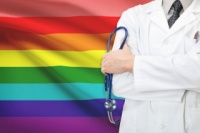Difference between revisions of "Prominent Medical Practitioners Who Identify as LGBTQ"
| Line 3: | Line 3: | ||
Recent research reports suggest that finding doctors competent to care for LGBTQ patients is becoming increasingly more difficult. It is therefore worth looking at the presence of LGBTQ medical practitioners who have made, or are making, an important contribution to this professional field. | Recent research reports suggest that finding doctors competent to care for LGBTQ patients is becoming increasingly more difficult. It is therefore worth looking at the presence of LGBTQ medical practitioners who have made, or are making, an important contribution to this professional field. | ||
| − | Whereas LGBTQ individuals may suffer the same medical conditions as society as a whole, it is known that their outcomes are worse. A large part of this is because few doctors identify themselves as knowledgeable and culturally competent with the community, and few hospitals have programs to train staff about the characteristics of the community. It is only in recent years that professional medical associations began accepting and recognizing the presence of LGBTQ physicians. Thirty percent of LGBTQ medical students | + | Whereas LGBTQ individuals may suffer the same medical conditions as society as a whole, it is known that their outcomes are worse. A large part of this is because few doctors identify themselves as knowledgeable and culturally competent with the community, and few hospitals have programs to train staff about the characteristics of the community. It is only in recent years that professional medical associations began accepting and recognizing the presence of LGBTQ physicians. Thirty percent of LGBTQ medical students in western countries, and two thirds of gender minority students, hide their sexual identity during medical school based on their fear of discrimination. |
| − | In this environment, having LGBTQ mentors and role models plays an important role. There is representation of these individuals, but knowledge about them is scarce or non-existent. | + | In this environment, having LGBTQ mentors and role models plays an important role. There is representation of these individuals, but knowledge about them is scarce or non-existent. A few examples of outstanding role models include: |
* the first practicing women physician in Scotland was lesbian [[Margaret Todd]]; | * the first practicing women physician in Scotland was lesbian [[Margaret Todd]]; | ||
| Line 11: | Line 11: | ||
* the world's first transgender President of a medical staff at a hospital is Canadian [[Carys Massarella]]; | * the world's first transgender President of a medical staff at a hospital is Canadian [[Carys Massarella]]; | ||
* physician [[Tom Waddell]] founded the Gay Games; | * physician [[Tom Waddell]] founded the Gay Games; | ||
| − | * Britain's [[Florence Nightingale]] created the nursing profession | + | * Britain's [[Florence Nightingale]] created the nursing profession. |
| + | |||
| + | |||
Revision as of 15:29, 7 August 2018
Recent research reports suggest that finding doctors competent to care for LGBTQ patients is becoming increasingly more difficult. It is therefore worth looking at the presence of LGBTQ medical practitioners who have made, or are making, an important contribution to this professional field.
Whereas LGBTQ individuals may suffer the same medical conditions as society as a whole, it is known that their outcomes are worse. A large part of this is because few doctors identify themselves as knowledgeable and culturally competent with the community, and few hospitals have programs to train staff about the characteristics of the community. It is only in recent years that professional medical associations began accepting and recognizing the presence of LGBTQ physicians. Thirty percent of LGBTQ medical students in western countries, and two thirds of gender minority students, hide their sexual identity during medical school based on their fear of discrimination.
In this environment, having LGBTQ mentors and role models plays an important role. There is representation of these individuals, but knowledge about them is scarce or non-existent. A few examples of outstanding role models include:
- the first practicing women physician in Scotland was lesbian Margaret Todd;
- the first practicing women physician in Queensland, Australia was lesbian Lilian Violet Cooper;
- the world's first transgender President of a medical staff at a hospital is Canadian Carys Massarella;
- physician Tom Waddell founded the Gay Games;
- Britain's Florence Nightingale created the nursing profession.
Australia
Cameroon
Canada
Germany
Great Britain
- Laurence Michael Dillon
- Henry Havelock Ellis
- Sir Ewan Forbes - Semphill
- Christian Jessen
- Sophia Jex-Blake
- Louisa Martindale
- Billy Nichols
- Florence Nightingale
Ireland
Nigeria
Portugal
Scotland
Uganda
United States
- Donald Abrams
- Rebecca Allison
- Dr. S. Josephine Baker
- Howard Brown
- Margarethe Cammermeyer
- Charlie Suzi Chapler
- Valerie Fein-Zachary
- Stephen Goldstone
- Mike Gotlieb
- Alan L. Hart
- Matt Heinz
- Uzodinma Iweala
- Peter O'Donnell
- Louise Pearce
- Hector Vargas
- Tom Waddell
- C. Dale Young
See Also
- LGBTQ Psychiatrists and Psychotherapists
- LGBTQ Individuals in the Fields of Sociology and Anthropology
Further Reading/Research
- http://www.glma.org/
- https://www.ncbi.nlm.nih.gov/pubmed/22029561
- https://med.stanford.edu/news/all-news/2015/02/many-lgbt-medical-students-choose-to-stay-in-the-closet.html
- https://www.reuters.com/article/us-lgbt-healthcare-lists-idUSKBN0NC2HE20150421
- http://www.physicianspractice.com/healthcare-careers/changing-times-lgbt-physicians

